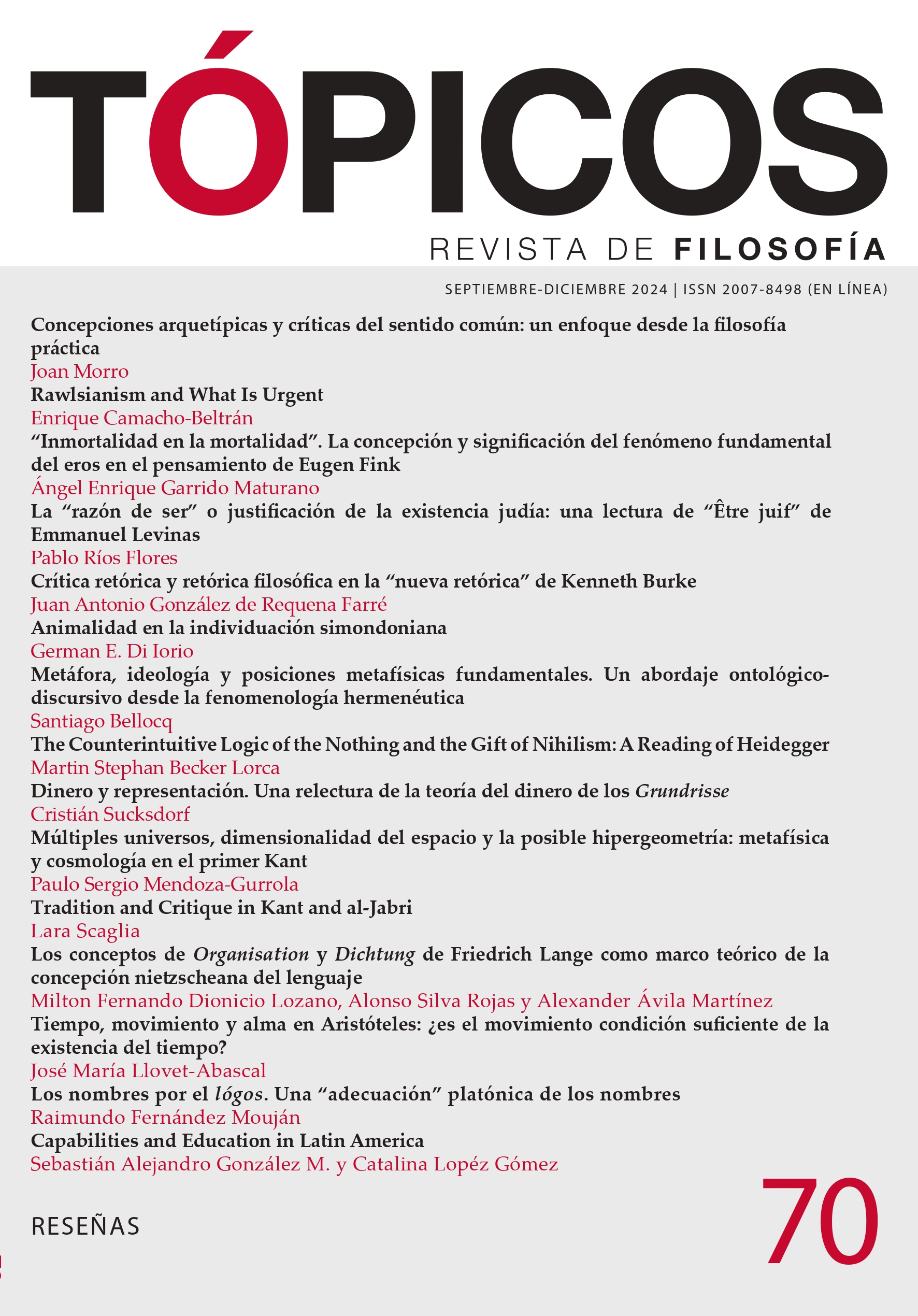Published 2024-08-15
How to Cite
Copyright (c) 2024 Tópicos, Revista de Filosofía

This work is licensed under a Creative Commons Attribution-NonCommercial-NoDerivatives 4.0 International License.
Downloads
Altmetrics
Citas
Abstract
In this paper, I focus on Kant’s notion of God, showing that his critical philosophy changed the meaning and function of traditional concepts. Then I move on to consider a philosopher of the contemporary Arab world, al-Jabri, who has been influenced by Kant: the author of the Critique of Arab Reason shares with Kant a dissatisfaction regarding a certain use of reason which does not inquire about its boundaries. Philosophy must confront its tradition, free it from prejudices, search for reasons and investigate the origin and uses of its concepts, but critically analysing tradition does not imply that the past cannot help charting the path of the future. A fresh reading of tradition could help modernize Islam without losing the cultural elements of identity.
References
- Allison, H. (2000). Is the Critique of Judgment “Post-Critical? In S. Sedgwick (ed.), The Reception of Kant’s Critical Philosophy: Fichte, Schelling, and Hegel. (pp. 78-92). Cambridge University Press.
- Al-Farabi, A. N. M. (1971). Fuṣūl Muntazaʿah. Dar al-Mashriq.
- Al-Jabri, M. A. (1994). Introduction à la critique de la raison arabe. A. Mahfoud & M.Geoffroy (tras.). La Découverte.
- Al-Jabri, M. A. (1999). Arab-Islamic Philosophy: A Contemporary Critique. A. Abbassi (trans.). The University of Texas Press.
- Al-Jabri, M. A. (2001). Ibn Rushd, syrah wa fikr. Markaz Dirasat al-Wahdah al-‘Arabiyyah.
- Al-Jabri, M. A. (2006). Al-Turāth wa-l-hadāthah. Markaz Dirasat al-Wahdah al-‘Arabiyyah.
- Al-Jabri, M. A. (2011). The Formation of Arab Reason: Text, Tradition and the Construction of Modernity in the Arab World. Centre for Arab Unity Studies (trans). I. B. Tauris.
- Al-No’man, T. (2008). La responsabilité dans la culture arabe islamique : épreuve pour l’individu, monopole des plus âges et des plus puissants. In E. Sizoo (ed.), Responsabilité et cultures du monde. Dialogue autour d’un défi collectif. (pp. 183-208). Éditions Charles Léopold Mayer.
- Al-Tamamy, S. M. S. (2014). Averroes, Kant, and the Origin of the Enlightenment. I. B. Tauris.
- Brandt, R. (1989). The Deduction of the Critique of Judgment: Comments on Hampshire and Horstmann. In E. Förster (ed.), Kant’s Transcendental Deductions. (pp. 177-192). Stanford University Press.
- Daifallah, Y. (2012). Political Subjectivity in Contemporary Arab Thought: The Political Theory of Abdullah Laroui, Hassan Hanafi, and Mohamed Abed al-Jabri. [Ph.D. dissertation, University of California, Berkeley]. eScholarship: Open Access Publications from the University of California. URL: https://escholarship.org/uc/item/1cc0g870.
- Druart, T. A. (1997). The Ethics of al-Razi (865-925?). Medieval Philosophy and Theology, 6, 47-71.
- Firestone, C. L. & Jacobs, N. (2008). In Defense of Kant’s Religion. Indiana University Press.
- Grier, M. (1997). Kant on the Illusion of a Systematic Unity of Knowledge. History of Philosophy Quarterly, 14, 1-28.
- Grünenberg, R. & Hegasy, S. (2009). Ex okzidente lux. Der arabische Aufklärer Mohammed Abed al-Jabri. In M. al-Jabri, Kritik der arabischen Vernunft. Die Einführung. (pp. 7-21). Perlenverlag.
- Guyer, P. (1997). Kant and the Claims of Taste. Cambridge University Press.
- Hare, J. E. (1996). The Moral Gap: Kantian Ethics, Human Limits, and God’s Assistance. Clarendon Press.
- Hasan, A. (2011, July 2). Democracy, Religion and Moral Values: A Road Map Toward Political Transformation in Egypt. Foreign Policy Journal. URL: https://www.foreignpolicyjournal.com/2011/07/02/democracy-religion-and-moral-values-a-road-map-toward-political-transformation-in-egypt/ .
- Hegasy, S. (2018). Dare to Be Wise! On the Reception of Mohammed Abed al-Jabri Post-2011. In Z. Eyasad, F. Corrao & M. Hashas (eds.), Islam, State, and Modernity: Mohammed Abed al-Jabri and the Future of the Arab World. (pp. 183-204). Palgrave.
- Horstmann, R. (1989). Why Must There Be a Transcendental Deduction in Kant’s Critique of Judgment? In E. Förster (ed.), Kant’s Transcendental Deductions. (pp. 157-176). Stanford University Press.
- Ibn Al-Nadīm. (1872). Al-Fihrist. T. Flugel (ed.). Vogel.
- Ibn Rushd. (1999). The Definitive Statement: Determining the Relationship between Divine Law and Human Wisdom. C. Butterworth (trans.). Routledge.
- Kant, I. (1996a). Practical Philosophy. M. J. Gregor (trans.). Cambridge University Press.
- Kant, I. (1996b). Religion and Rational Theology. A. W. Wood & G. di Giovanni (trans.). Cambridge University Press.
- Kant, I. (1998). Critique of Pure Reason. P. Guyer & A. Wood (trans.). Cambridge University Press.
- Kant, I. (2000). Critique of the Power of Judgement. P. Guyer (trans.). Cambridge University Press.
- Keller, C. A. (1996). Une approche de la mystique dans les religions occidentales et orientales. Albin Michel.
- Khirallah, I. (2020). Responsibility. Between Al-Jabri’s Deconstruction of the Arabic-Islamic Tradition and Hans Jonas’s Ethical Theory: Parallels and Discords. [Ph.D. dissertation, University of Wrocław].
- Laroui, A. (1978). La Crise des intellectuels arabes : traditionalisme ou historicisme ? Maspero.
- Makkreel, R. (2006). Reflection, Reflective Judgment, and Aesthetic Exemplary. In R. Kukla (ed.), Aesthetics and Cognition in Kant’s Critical Philosophy. (pp. 223-244). Cambridge University Press.
- Palmquist, S. (2000). Kant’s Critical Religion. Ashgate.
- Pasternack, L. (2014). Kant’s Religion within the Boundaries of Mere Reason: An Interpretation and Defense. Routledge.
- Plantinga, A. (1966). Kant’s Objection to the Ontological Argument. The Journal of Philosophy, 63(19), 537-546.
- Reardon, B. (1988). Kant as Philosophical Theologian. Macmillan Press.
- Tuschling, B. (1992). The System of Transcendental Idealism: Questions Raised and Left Open in the Kritik der Urteilskraft. The Southern Journal of Philosophy, 30, 109-127.
- Youssef, M. K. R. (1999). Al-Muru’a According to the Prophet, the Companions and the Followers. Dar Ibn Hazm.





